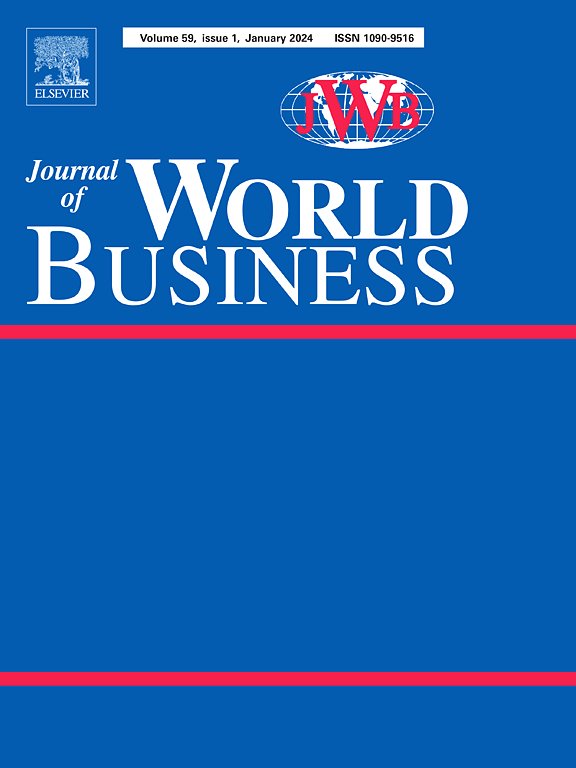政治意识形态与跨国企业:认识论视角的拓宽
IF 8.8
1区 管理学
Q1 BUSINESS
引用次数: 0
摘要
虽然自国际商务(IB)领域成立以来,政治和风险等政治问题一直主导着该领域的议程,但对政治意识形态作用的认识尚处于萌芽阶段。在本文中,我们试图阐明政治意识形态在跨国企业(MNEs)及其经营环境中的作用和影响。在此过程中,我们的目标是探索跨国公司内部意识形态的微观基础,通过纳入跨国意识形态多样性来扩大研究的认识论范围,并研究跨国公司面临的复杂意识形态景观。此外,我们希望证明IB的比较性质使该领域非常适合调查植根于众多背景的组织内的政治意识形态;迄今为止,意识形态研究主要集中在美国公司和简单的保守主义-自由主义轴心上。在全球意识形态两极分化日益严重的时代,通过解决跨国公司的意识形态维度,我们为寻求理解意识形态如何塑造跨国公司、跨国公司的全球战略、运营及其更大的社会影响的学者提供了新的理论见解。因此,我们希望将政治意识形态置于IB研究议程的首位。本文章由计算机程序翻译,如有差异,请以英文原文为准。
Political ideology and the multinational enterprise: Broadening the epistemological lens
While politics and political issues such as risk have dominated the agenda of international business (IB) since the field’s founding, appreciation for the role of political ideology is nascent. In this article, we seek to shed light on the role and impact of political ideology within multinational enterprises (MNEs) and the context in which they operate. In so doing, we aim to explore the micro-foundations of ideology within MNEs, to broaden the epistemological scope of study by incorporating cross-national ideological diversity, and to examine the complex ideological landscape confronting MNEs. In addition, we hope to demonstrate that the comparative nature of IB makes the field highly suitable for investigating political ideologies within organizations rooted in numerous contexts; to date, ideology research has primarily centered its attention on U.S. firms and the simplistic conservatism-liberalism axis. By addressing the ideological dimensions of IB in an era marked by increasing multidimensional ideological polarization worldwide, we offer novel theoretical insights for scholars seeking to understand how ideology shapes MNEs, their global strategy, operations, and their larger societal impact. We hope, therefore, to put political ideology at the forefront of the IB research agenda.
求助全文
通过发布文献求助,成功后即可免费获取论文全文。
去求助
来源期刊

Journal of World Business
BUSINESS-
CiteScore
16.50
自引率
11.20%
发文量
73
期刊介绍:
The Journal of World Business holds a distinguished position as a leading publication within the realm of International Business. Rooted in a legacy dating back to 1965, when it was established as the Columbia Journal of World Business, JWB is committed to disseminating cutting-edge research that reflects significant advancements in the field. The journal actively seeks submissions that propel new theoretical frameworks and innovative perspectives on International Business phenomena. Aligned with its domain statement, submissions are expected to possess a clear multinational, cross-border, or international comparative focus, while remaining pertinent to the study of management and organizations. JWB particularly encourages submissions that challenge established theories or assumptions, presenting pioneering or counterintuitive findings. With an inclusive approach, the journal welcomes contributions from diverse conceptual and theoretical traditions, encompassing allied social sciences and behavioral sciences. Submissions should either develop new theories or rigorously test existing ones, employing a variety of qualitative, quantitative, or other methodological approaches. While JWB primarily caters to scholars and researchers, it values contributions that explore implications for Multinational Enterprises and their management, as well as ramifications for public policy and the broader societal role of business.
 求助内容:
求助内容: 应助结果提醒方式:
应助结果提醒方式:


